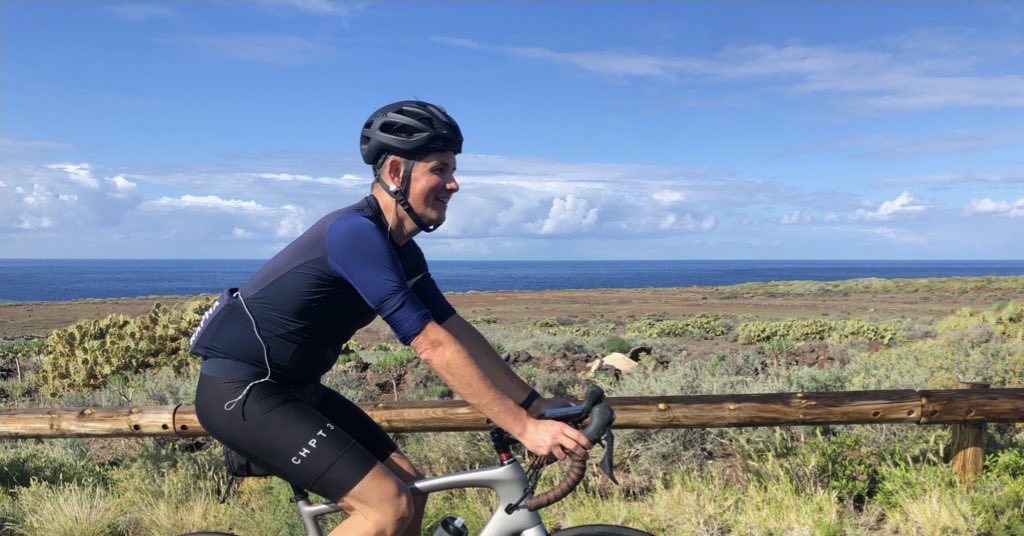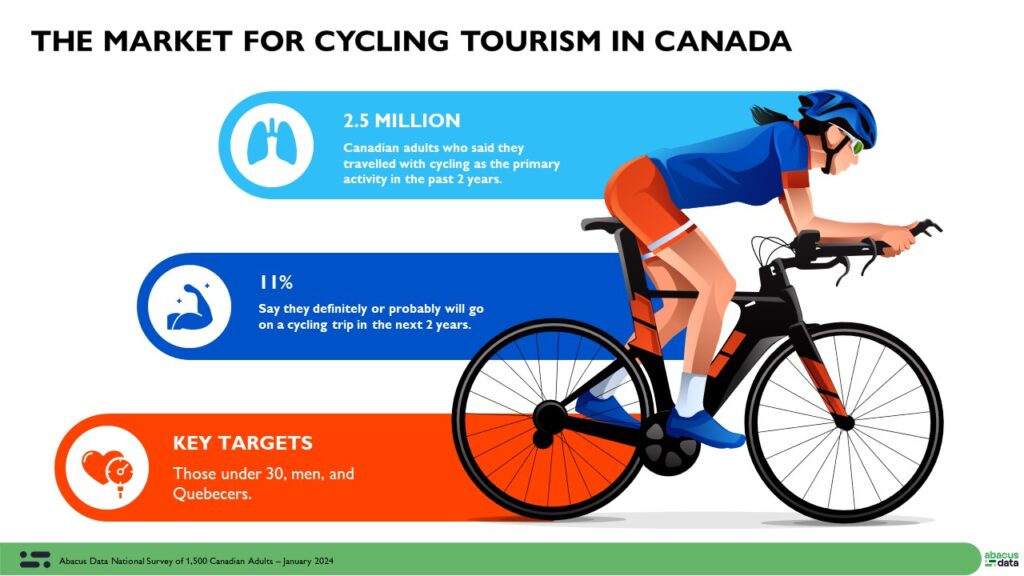Reflections of a cycling tourist on the opportunities for Canadian destinations to welcome the millions who travel for cycling.
February 1, 2024
As most followers of Abacus Data know, I’m an avid traveler and a dedicated road cyclist. I’ve always believed that cycling is not just a sport or a pastime, but a unique way to experience the world. It offers an intimacy with the landscapes and cultures unlike any other mode of travel.
At Abacus Data, a leading Canadian market research and public opinion firm, we recently conducted a study that delves into the growing trend of cycling tourism in Canada, revealing insights that could shape the future of travel and tourism.
The Joy of Cycling Travel
Traveling with a road bike is a love affair with freedom and exploration. Cycling allows you to see more of a place, its nooks and crannies, the hidden gems that remain unseen from the windows of a car or a tour bus. It’s about feeling the terrain change beneath your wheels, from the smooth asphalt of urban landscapes to the rugged trails of rural backroads. This kind of travel keeps you fit, making every indulgent meal a guilt-free pleasure. After a day of pedaling, there’s nothing quite like the satisfaction of a hearty meal and a glass of fine wine.
I’ve been so lucky to take my bike to some of the most beautiful and bike friendly places in the world.
My favourite destinations exemplify this blend of physical challenge and sensory reward.
Mallorca is a cyclist’s dream with its friendly drivers, perfect roads, and diverse scenery. It’s a place where every turn offers a new vista and every small town invites you with a warm café con leche.

Maui, a Hawaiian Island, with its dramatic coastlines and the awe-inspiring ascent of a volcano, provides a ride that feels like a scene from a movie.
And Gatineau Park, my local haven, offers peaceful, car-free rides amidst breathtaking scenery and wildlife just minutes from downtown Ottawa, making the Nation’s Capital an ideal destination for cyclists.


Insights from the Abacus Data’s Market Research
Our recent survey at Abacus Data sheds light on the state of cycling tourism in Canada.
Approximately 2.5 million Canadians, or 8% of the adult population, have gone on a cycling vacation in the past two years, choosing destinations specifically for their cycling appeal. Notably, this trend is more prevalent among Quebecers (11%) and significantly less so in the Prairies (5%). It’s intriguing to see that younger adults, aged 18 to 29, are more likely to embark on such trips (17%) compared to only 2% of those over 60.
Looking forward, the future seems bright. About 11% of Canadians are planning a cycling-focused vacation in the next two years, with an additional 19% considering it. These statistics not only highlight a growing interest in cycling tourism but also point to a significant market opportunity for destinations across Canada.

The Potential for Destinations, Municipalities, and Communities
The economic impact of cycling tourism can be substantial. Taking Mallorca as a benchmark, which attracts around 200,000 cyclo-tourists annually, generating approximately €300 million (roughly 430 million Canadian dollars), the potential for Canadian communities is there. To become cycling tourism-friendly, destinations must focus on several key aspects:
- Infrastructure: Good roads with safe, wide shoulders are essential. Cyclists prioritize safety and comfort when choosing their routes. For example, the area around Collingwood, Ontario would be so great for cycling if more of its roads had shoulders.
- Accommodations: Availability of short-term rentals or hotels that cater to cyclists, offering secure bike storage and maintenance facilities. Cyclists need space to store their bikes. Often they want kitchens to prep meals and a hot tub or spa is an added benefit to relax those sore legs.
- Community Accessibility: Destinations should have communities close enough to each other, allowing cyclists to easily find places to rest, eat, and explore.
Cycling tourists contribute significantly to local economies. They tend to spend more on accommodations, food, and local experiences. Municipalities, policymakers, and tourism operators can attract more cycling tourists by improving infrastructure, creating bike-friendly policies, and promoting their destinations as cycling hubs.
As a devoted cycling tourist, I can attest that destinations with these qualities not only attract more visitors but also enhance the quality of life for local residents. They foster a culture of fitness, environmental awareness, and community engagement. They also provide a significant source of income to cafes, restaurants, bike shops, retailers, and hotels in the area.
Implications
The increasing interest in cycling vacations is more than a trend; it’s a shift in how people want to experience the world driven by generational change.
As Canadians, we have a unique opportunity to embrace this shift, enhancing our infrastructure and services to welcome cycling tourists. By doing so, we not only diversify and strengthen our tourism industry but also contribute to the well-being of our communities and the environment. The journey ahead is promising, and as we pedal forward, let’s create paths that welcome both the wheels of visitors and the strides of progress.
When we ask people if they would consider voting for each of the main political parties, 5q% say they are open to voting Conservative (down 3 since mid-January) while, 43% are open to voting NDP, and 42% are open to voting Liberal (+1).
Methodology
The survey was conducted with 1,500 Canadian adults from January 5 to 9, 2024. A random sample of panelists were invited to complete the survey from a set of partner panels based on the Lucid exchange platform. These partners are typically double opt-in survey panels, blended to manage out potential skews in the data from a single source.
The margin of error for a comparable probability-based random sample of the same size is +/- 2.8%, 19 times out of 20.
The data were weighted according to census data to ensure that the sample matched Canada’s population according to age, gender, educational attainment, and region. Totals may not add up to 100 due to rounding.
This survey was paid for by Abacus Data Inc.
Abacus Data follows the CRIC Public Opinion Research Standards and Disclosure Requirements that can be found here: https://canadianresearchinsightscouncil.ca/standards/
ABOUT ABACUS DATA
We are the only research and strategy firm that helps organizations respond to the disruptive risks and opportunities in a world where demographics and technology are changing more quickly than ever.
We are an innovative, fast-growing public opinion and marketing research consultancy. We use the latest technology, sound science, and deep experience to generate top-flight research-based advice to our clients. We offer global research capacity with a strong focus on customer service, attention to detail, and exceptional value.
We were one of the most accurate pollsters conducting research during the 2021 Canadian election following up on our outstanding record in 2019.
Contact us with any questions.
Find out more about how we can help your organization by downloading our corporate profile and service offering.




